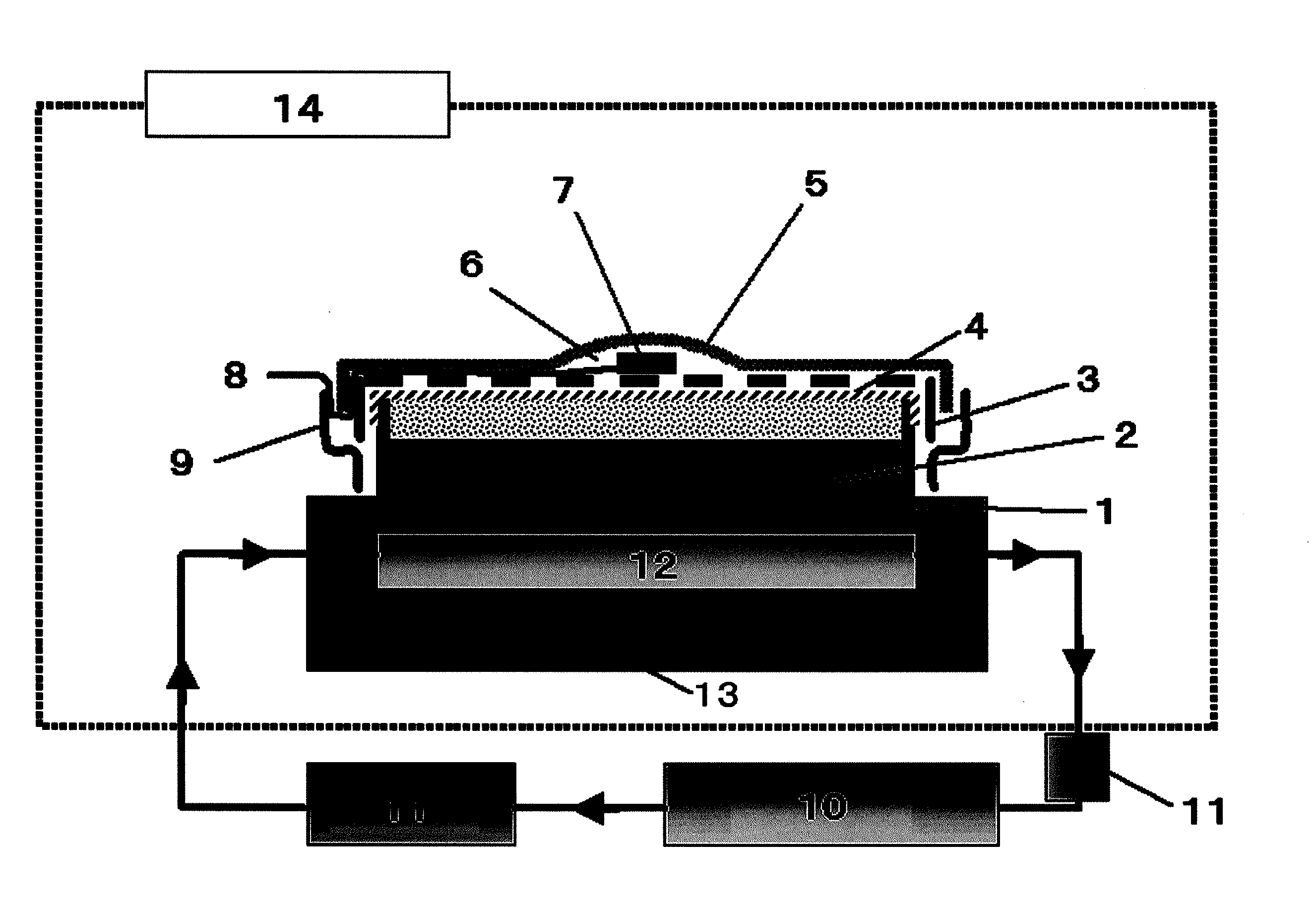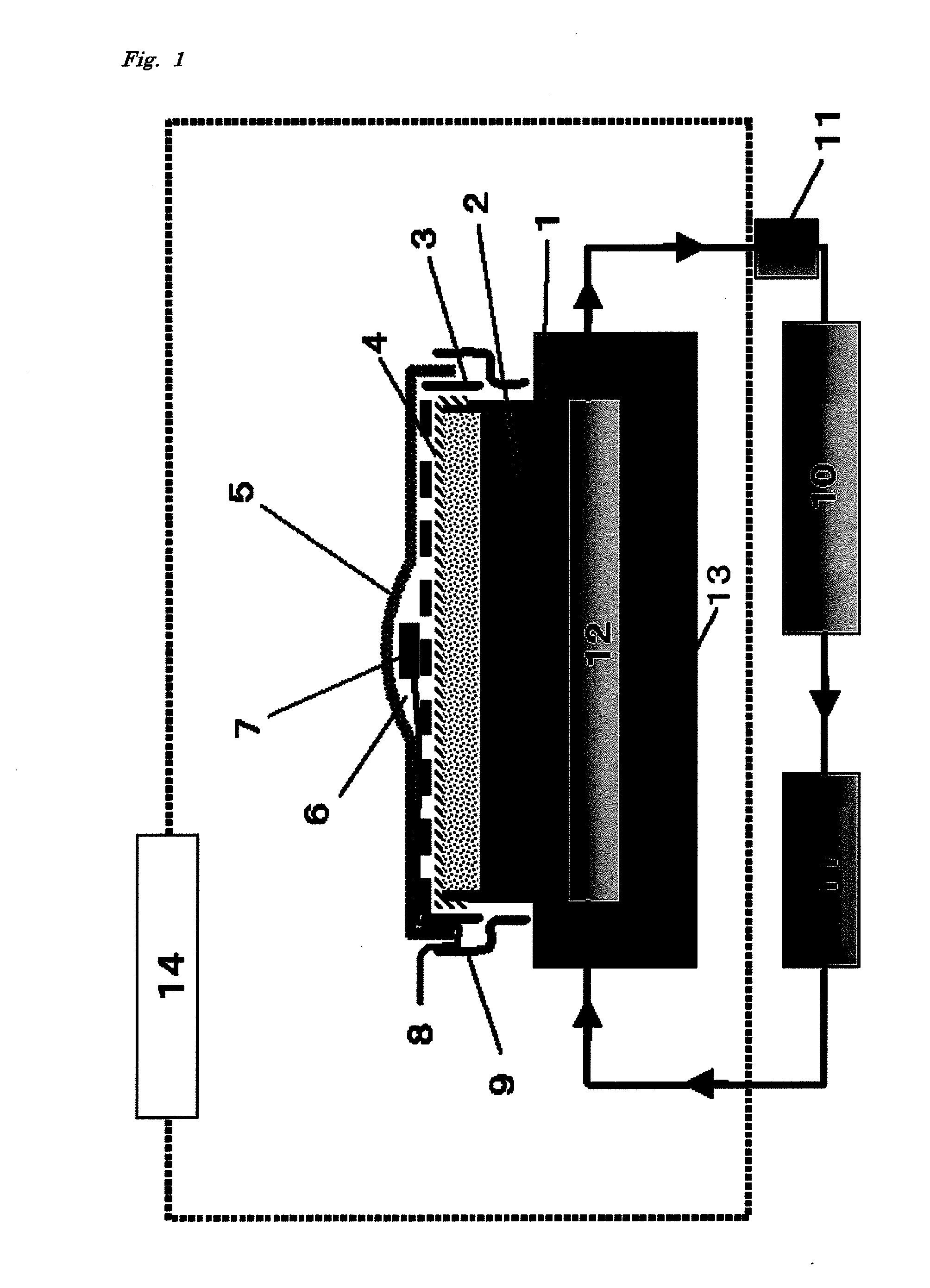Apparatus for simulatively measuring environment of wound dressing on skin and measuring method therefor
a technology of environment and measuring apparatus, which is applied in the field of apparatus and a measurement method for simulating an environment in a microspace, can solve the problems of not having obtained or reported any data on an environment, and the measurement of hygrothermal characteristics at a wound area or a decubital area on a human skin is very difficult, so as to facilitate the development of improved wound dressings more suitable for us
- Summary
- Abstract
- Description
- Claims
- Application Information
AI Technical Summary
Benefits of technology
Problems solved by technology
Method used
Image
Examples
example 1
[0065]The commercially available products “A” and “B” (wound dressings) were used as the samples 5, and humidity, one of the factors of an external environment, was investigated.
[0066]The container 1 having the water retentive member 2 and the water vapor diffusion-controlling member 4 previously set therein was placed on the heat exchanger 12, which was set in the constant temperature-and-humidity chamber 14 for controlling an external environment (EYELA constant temperature-and-humidity chamber KCL-2000W manufactured by TOKYO RIKAKIKAI CO., LTD.), and the container 1 was preliminarily warmed.
[0067]After the preliminary warming, the sample 5 (the commercially available wound dressings) and the temperature-and-humidity sensor 7 (digital temperature-and-humidity sensors TRH-CA, manufactured by SHINYEI KAISHA) were set to the container 1. For the external environment, simulating an inner condition of bedclothes, temperature was set at 35° C. and humidity was set at 40% RH, 50% RH and ...
example 2
[0070]A variety of water retentive members 2 and water vapor diffusion-controlling members 4 were examined, with the use of the commercially available products “A” and “B” (the wound dressings) as the samples 5, like in Example 1. The external environment was set at 35° C. in temperature and at 40% RH in humidity. The results are shown in Table 3.
[0071]It was found that with various combinations of the water retentive members 2 and the water vapor diffusion-controlling members 4, it is possible to control the humidity in the microspaces 6, and to simulatively reproduce the presence or absence of the exudates on the decubital areas.
Table 3 (Annexed Sheet)
example 3
[0072]Changes of humidity and temperature in the microspaces 6 during a short time period were measured with time, with the use of the commercially available products “A”, “B”, “C” and “D” (the wound dressings) as the samples 5, like in Example 1. The external environment was set at 35° C. in temperature and at 40% RH in humidity. The results are shown in Table 4.
[0073]In the conditions where the exudates were present in the decubital areas, there was almost no variation on the temperature and the humidity in the microspaces 6, in the four commercially available products. But, in the conditions where almost no exudates were in the decubital areas, the humidity in the microspaces 6 for the commercially available products “B” and “D” were found to be slightly lower than that for the commercially available product “A”. This was supposed to come from the difference of the compositions of the products.
Table 4 (Annexed Sheet)
PUM
 Login to View More
Login to View More Abstract
Description
Claims
Application Information
 Login to View More
Login to View More - R&D
- Intellectual Property
- Life Sciences
- Materials
- Tech Scout
- Unparalleled Data Quality
- Higher Quality Content
- 60% Fewer Hallucinations
Browse by: Latest US Patents, China's latest patents, Technical Efficacy Thesaurus, Application Domain, Technology Topic, Popular Technical Reports.
© 2025 PatSnap. All rights reserved.Legal|Privacy policy|Modern Slavery Act Transparency Statement|Sitemap|About US| Contact US: help@patsnap.com


